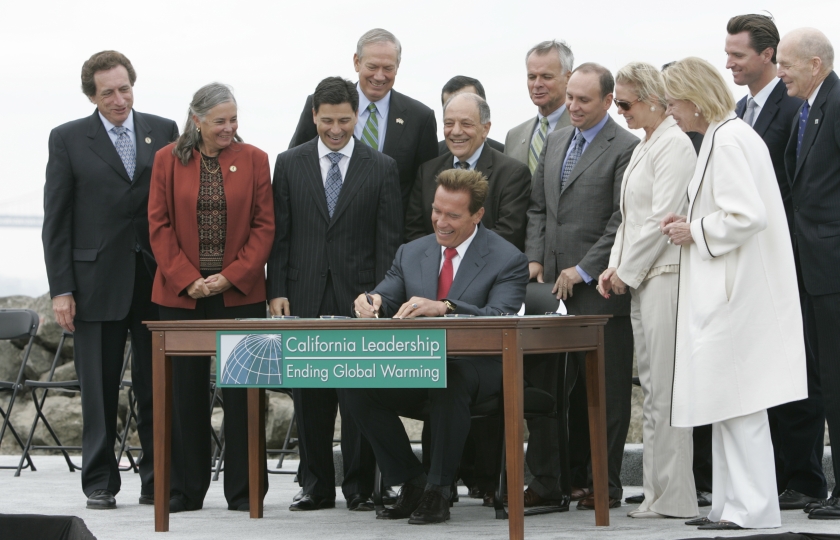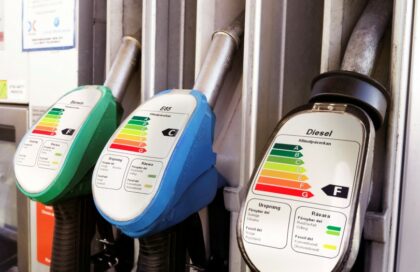In March 2023, the Hawaii Senate passed bill SB506, requiring climate change and health warning labels on gas pumps. Supportive testimony was submitted to the Hawaii Legislature not only from local stakeholders, but from international experts, several of whom are lead authors for the IPCC. Here we publish excerpts from some of these testimonies.
The House Committee on Energy & Environmental Protection later on deferred the measure passed by the Senate. Green Mobilists Sweden urge the Hawaii Legislature to revive the bill, making Hawaii the first U.S. state with climate and health information on all gas pumps – and an example for the world together with Sweden.
As further inspiration for the Hawaiians, we add a supportive statement by Arnold Schwarzenegger on the occasion of the introduction of eco-labels on Swedish fuel dispensers. The USC Schwarzenegger Institute followed up with a supportive testimony to the Hawaii Legislature.
I am proud to serve on the Cambridge City Council which unanimously passed a local ordinance requiring gas pump labels in January of 2020. The labels are on every gas pump in the city. […] We pioneered this policy as a city, and hope that Hawaii will be the first state. I will continue to work to have our state follow you! […] As the country did with cigarette warning labels, now we should do with gas pump labels.
When we proposed the ordinance, there was considered discussion on why it was an important public policy benefit. We thoroughly deliberated, and passed the ordinance unanimously. Since the placement of labels, we have only had positive feedback.
Patricia Nolan, City Council of Cambridge, MA
We are public health professionals who have long supported placing health warnings on fossil fuel ‘points of use’, such as gas pumps, to recognize that transportation is the primary source of greenhouse gas emissions in Hawai’i. These warnings can modify the low public awareness of the health and climate effects from the combustion of conventional transportation fuels.
We believe this to be an important intervention that will help consumers in the transition towards less carbon-intense transport. As we have argued, highlighting health impacts of products is more likely to be persuasive in changing consumer behaviour than referring only to environmental impacts. As you may know, Sweden and the City of Cambridge, MA have climate-health information labels on all gas pumps.
Kristie L. Ebi, Distinguished Professor, Center for Health and the Global Environment, University of Washington, Seattle
Lorraine Whitmarsh, Professor, Director – Centre for Climate Change & Social Transformations (CAST), Department of Psychology, University of Bath, United Kingdom
Dr Mike Gill, former Regional Director of Public Health, England
Sir Andrew Haines, Professor of Environmental Change and Public Health, former director of London School of Hygiene & Tropical Medicine
Our estimates of the economic damages from burning transportation fuels like gasoline and diesel for regular unleaded gasoline amount to $6.50 per gallon. Diesel fuel, with higher PM2.5 concentrations, causes damages of about $8 per gallon.
The Hawai’ian bills create greater transparency in fossil fuel markets and consumers have a right to know about the health and climate impacts when they buy conventional petroleum fuels. Additionally, mandating oil company transparency through government regulation is essential as these costs are hidden, continue to accrue, and purchaser of these fuels need to be notified to have the ability to make better choices.
The harms resulting from fossil fuel combustion are not well-understood by consumers of gas but should be since a transition off fossil fuels is required to keep human-caused climate change from having far more damaging consequences than those we are already seeing. Gas pump labels should be essential policy for other states and countries to follow.
Drew Shindell, Distinguished Professor of Climate Sciences in the Earth and Climate Sciences Division at Duke University in Durham, NC
As a public health communication expert, l can testify to the important effect that well-constructed labeling programs can have in shifting consumer preferences. In the case of gasoline and diesel, consumers need and have a right to know science-based information about the immediate health harms and long-term climate harms caused by burning fossil fuels.
Effective public health communication campaigns feature simple, clear, relevant messages, repeated often, by a variety of trusted sources. The pump label proposed in SB 143 will support Hawaii’s stated goals of moving toward an electrified transportation system. Moreover, it will do so in a completely non-coercive manner, through education.
A State of Hawaii warning label at the gas pump is both a science-based and a common-sense measure that can help the people of Hawai’i protect their health and the health of our climate.
Edward Maibach, Distinguished Professor and Director George Mason University Center for Climate Change Communication
I have long studied the power of social norms programs like this one, and the role of behavioral modifications required to create low-carbon transportation. In my view, health-climate labels on gas pumps educating the public at scale have the potential to alter preferences away from gasoline and diesel fuels.
This needed public education program cannot happen without government intervention. Healthclimate warning labels at gas pumps will help people understand the urgent need for cleaner transport alternatives, and the essential role they play in a low carbon transportation future.
I applaud Hawai’i, its people, and its global climate leadership. Providing more information is a good low-cost strategy to mitigate fossil fuel harms.
Dan Sperling, Distinguished Professor of Civil Engineering and Environmental Science & Policy, University of California, Davis. Founding Director, Institute of Transportation Studies
[Y]ears of health communication research provides strong evidence that repetition is necessary and important to influence individual’s behavior. Knowledge alone does not prompt action and repeated cues and messages are imperative if we want to motivate people to act. […] Well placed cues and messages are critically important in influencing people’s cognition as well as their behaviors.
Hye-ryeon Lee, Professor, health communication researcher, University of Hawaii at Manoa
Climate warning labels are a timely and urgent way to better inform consumers. Hawaiian legislators have the opportunity to create a new global pathway for consumer protection for others to follow.
USC Schwarzenegger institute (posted by Francisca Martinez, Deputy Environmental Policy Director)
[T]he people should know that when they pump gas they are contributing to the greenhouse gases. So in order to discourage people from doing that, let them all, everyone out there, be part of the crusade. They all should become crusaders.
Arnold Schwarzenegger (on the occasion of the introduction of eco-labels on fuel dispensers in Sweden)

The potential effects of warning labels or eco-labels are analysed in more depth in recent review articles in Global Challenges and Nature Climate Change.


